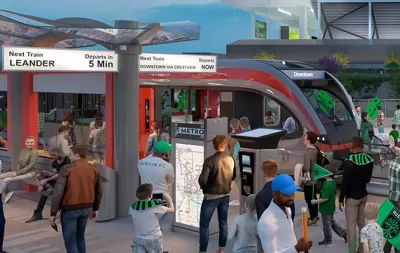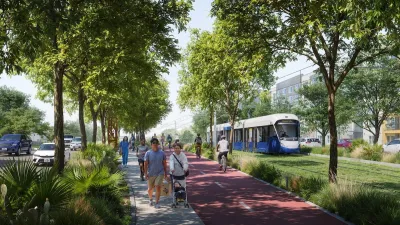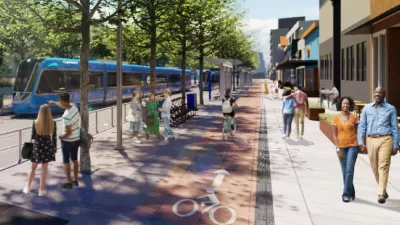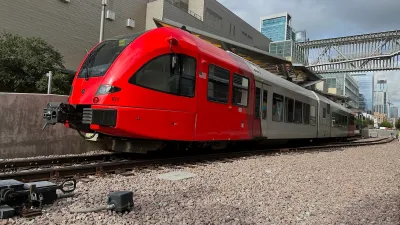The massive transit project’s unique funding scheme could run afoul of state law.

Austin’s Project Connect could be in jeopardy after Texas Attorney General Ken Paxton issued an opinion stating that the project’s “unique financing model is likely illegal,” setting off concerns among supporters of the potentially transformative $7 billion transit investment.
Ryan Autullo outlines the situation in Austin American-Statesman, writing: “Voters approved two things that are at issue in Paxton's opinion: a 20% increase in the city portion of their property tax, and the establishment of a local government corporation to build the system, financed by debt backed by that tax revenue. That tax revenue transfer, according to a city resolution, is to continue indefinitely until funds are no longer required for ‘operations, maintenance, or state of good repair.’”
According to Autullo, “The opinion says Austin is not authorized to pay down debt with the increased maintenance and operation taxes. It also says the tax revenue, about $160 million a year, cannot be transferred to the local government corporation in perpetuity without the ability to terminate at the end of each budget period.” The opinion comes alongside proposed legislation that would require Texans to vote on Project Connect again because the first proposal did not include an approval of new debt.
The city has few options to save Project Connect. “The city could hold a bond election to fund the project, but that would be tricky as the light rail cost is fluid and city leaders would largely be guessing on the amount they'd ask voters to approve.” The city could also use a municipal bond, which “might also spell financial trouble for the city.”
FULL STORY: Ken Paxton raises legal concerns on Austin's financial model for Project Connect

Alabama: Trump Terminates Settlements for Black Communities Harmed By Raw Sewage
Trump deemed the landmark civil rights agreement “illegal DEI and environmental justice policy.”

Planetizen Federal Action Tracker
A weekly monitor of how Trump’s orders and actions are impacting planners and planning in America.

How Atlanta Built 7,000 Housing Units in 3 Years
The city’s comprehensive, neighborhood-focused housing strategy focuses on identifying properties and land that can be repurposed for housing and encouraging development in underserved neighborhoods.

In Both Crashes and Crime, Public Transportation is Far Safer than Driving
Contrary to popular assumptions, public transportation has far lower crash and crime rates than automobile travel. For safer communities, improve and encourage transit travel.

Report: Zoning Reforms Should Complement Nashville’s Ambitious Transit Plan
Without reform, restrictive zoning codes will limit the impact of the city’s planned transit expansion and could exclude some of the residents who depend on transit the most.

Judge Orders Release of Frozen IRA, IIJA Funding
The decision is a victory for environmental groups who charged that freezing funds for critical infrastructure and disaster response programs caused “real and irreparable harm” to communities.
Urban Design for Planners 1: Software Tools
This six-course series explores essential urban design concepts using open source software and equips planners with the tools they need to participate fully in the urban design process.
Planning for Universal Design
Learn the tools for implementing Universal Design in planning regulations.
Caltrans
Smith Gee Studio
Institute for Housing and Urban Development Studies (IHS)
City of Grandview
Harvard GSD Executive Education
Toledo-Lucas County Plan Commissions
Salt Lake City
NYU Wagner Graduate School of Public Service





























